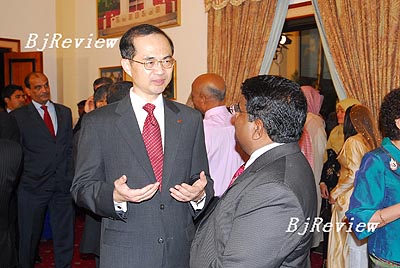|

The Maldives is planning to officially open its embassy in Beijing later this year. Demonstrating its ever strengthening relations with China, the embassy will serve as a portal through which the two countries will further enhance their bilateral cooperation in all fields.
Since China and the Maldives established diplomatic relations on October 14, 1972, ties between the two countries have been sound and consistent.
To commemorate the 35th anniversary of Sino-Maldivian relations, some performing arts troupes from China recently held cultural shows in the Maldives. Hopefully, programs with Chinese TV and radio signals will be retransmitted to the Maldives by the end of this year.
China and the Maldives have enjoyed close and amicable contacts since ancient times. In the early 15th century during the Ming Dynasty (1368-1644), Chinese navigator Zheng He led a fleet of merchant ships and arrived twice in the Maldives. Also, King Yusof of the Maldives dispatched his envoys to China three times after 1416.
In recent years, relations between the two countries have been growing comprehensively, instilling fresh vitality in the traditional friendship. The two countries have maintained frequent high-level visits. In September 2006, H. E. Maumoon Abdul Gayoom, President of the Republic of Maldives, paid a historical state visit to China and reached broad consensus with the Chinese leaders on expanding reciprocal cooperation in many areas such as economy, trade, fisheries, infrastructure construction, tourism, culture, education and human resource development. As follow-up measures, the Minister of Foreign Affairs of the Maldives and the Minister of Agriculture of China visited each other's country in 2007.
Cooperation in economy and trade between China and the Maldives has been exceptionally rewarding and mutually beneficial to both sides. Since July 2006, the Chinese Government has granted zero-duty market access to some 300 commodities exported from the Maldives. As a result, exports from the Maldives to China in 2006 grew more than 2,000 percent over the previous year.
In recent years, the Maldives has become a tourist attraction for the Chinese. Thanks to the agreement on Accredited Destination Status signed by the two countries in 2002 and the inauguration of direct flights between Shanghai and Malé in April 2007, more and more Chinese tourists are coming to the Maldives than ever before. The total number of Chinese arrivals in the Maldives in 2006 was about 30,000, an increase of 125 percent compared with the previous year.
As a reliable partner of the Maldives, China has continuously provided development assistance to the Maldives over a long period of time, under which several important projects have been implemented in the Maldives. The new office building of the Foreign Ministry of the Maldives funded and built by China stands as a token of friendship between the two countries. Construction work on the Maldives National Museum Project, which is also funded by China, will commence very soon. China also has been providing Governmental Scholarships to Maldivian students.
The tsunami at the end of 2004 caused huge property losses in the Maldives. Sharing the bitter experience with the Maldives, China provided emergency relief goods and funds to the Maldives shortly after the disaster happened and undertook some post-disaster rehabilitation projects including the Residential Housing Project.
The two countries have been consistently supporting each other's national concerns. The Maldives has unswervingly and staunchly observed the one-China policy. Meanwhile, the Chinese Government has always respected the path of national development chosen independently by the Maldivian people. China fully understands and always calls on the international community to attach a higher priority to the concerns of the Maldives on issues such as increases in the sea level caused by global climate change and the security of small and medium-sized nations. China is grateful to the constructive role played by the Maldives in pushing China to become an observer to the South Asia Association for Regional Cooperation (SAARC).
The Chinese Government cherishes its traditional friendship with the Maldives and commits itself to enhancing the amiable cooperation. China wishes to take the opportunity of the 35th anniversary of the establishment of diplomatic relations to deepen its mutual political trust with the Maldives and to explore further avenues to expand fruitful cooperation in economy, trade, fishery, tourism, culture as well as other areas.
|
Garland of Islands
Situated in the Indian Ocean about 600 km southwest of India and Sri Lanka, the Republic of Maldives, literally meaning "garland of islands," consists of 1,190 coral reef islands of which only 200 are inhabited. It is also known as "the pearl necklace of the Indian Ocean." Blessed with crystal-sand beaches, splendid submarine resources and a tropical climate, the Maldives has become one of the most popular tourist destinations in the world.
The island country covers an overall area of about 90,000 square km, while the land area is only about 300 square km. The Maldivians, nearly 300,000, are all devout Muslims. The economy of the country mainly relies on service sectors driven by tourism. Although it is still listed as a least developed country by the United Nations, the Maldives has maintained an annual average economic growth rate of 10 percent since 1980, and its per-capita GDP reached about $2,800 in 2006. |
The author is the Ambassador of China to the Republic of Maldives |
